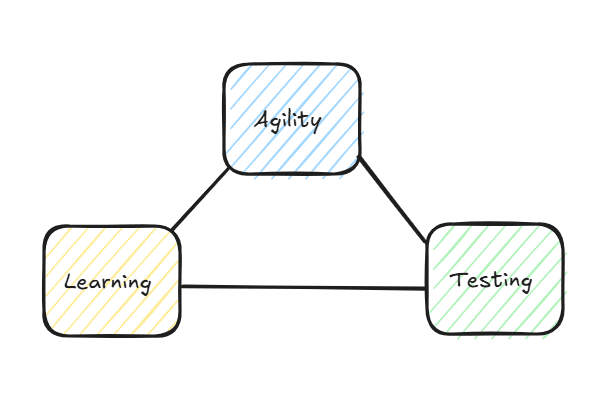Navigating the AI Tornado: A New SEO Playbook

I had the pleasure to be part of an event for SEO ranking recently. Here's my talk if you'd like to watch. This blog summarizes everything for you as well!
The SEO landscape has changed, and clinging to outdated strategies is akin to steering the Titanic. The traditional "checklist" SEO approach, heavily reliant on Google and its ten blue links, is no longer sufficient.
It's time we update our playbooks! Here's what's changed and what you need to do about it!
The SEO Riddler Newsletter
Join the newsletter to receive the latest updates in your inbox.
1# User Experience Takes Center Stage
The Department of Justice documents and API leaks from Erfan Azimi have shed light on the crucial role user behavior plays in search engine rankings. User experience is no longer just a buzzword; it's the magic behind Google search. Google doesn't truly "understand" content; rather, it mimics understanding by observing how users interact with search results and web pages. This means factors like click-through rates (CTR), dwell time, and bounce rates hold significant weight in determining rankings.
Analyzing user behavior on the page for SEO
SEOs need to move beyond traditional on-page factors and incorporate tools like Microsoft Clarity and Hotjar into their audits to analyze user behavior. Here's an example of how User Experience can influence SEO, where Erika increased a page’s search performance by 50% with less than 5 minutes of effort using insights from user behavior from Microsoft Clarity (a free tool btw). She did not use traditional SEO changes (e.g., metadata, content rewriting, internal links, or dates).
CTR Tests
Another thing that is crucial to be part of your SEO playbook is CTR tests. I've been an advocate for this for many reason:
I do not encourage or recommend any spammy tactics like CTR manipulation. However, we the data in those 2 case studies shows few things:
- One site moved from #34 to #10 (in 22 days)
- Importance of CTR and user behavior in SERPs also aligns with DOJ documents & the Google API leaks.
- We thought improved rankings improve CTR, but maybe it’s the other way around? CTR should be our focus metric?
If you're wondering What to do: here's a resource to help you test different page titles.
2# Beyond Google
SEO is no longer solely about Google; it's about any platform that appears in search results. This includes not only alternative search engines like DuckDuckGo but also platforms like YouTube, Reddit, Quora, and even Facebook groups.
Video content
Video content, in particular, deserves special attention. YouTube, as the second largest search engine, holds immense potential for driving traffic and brand visibility. Optimizing existing video assets, analyzing competitor videos, and incorporating video creation into content strategies should be top priorities for SEOs.
In addition, optimizing your existing video assets on Youtube helps you in 3 ways:
- Rank better in Google SERPs
- Rank better in the video filter on Google
- Rank better on Youtube
Are you auditing your clients YouTube Channel?
Perplexity pulling answers from inside Youtube videos
Below is an example that once again demonstrated the importance of video content! I searched for "no makeup makeup" on perplexity and some parts of the answer were pulled from a video!
Tell me again, why are you ignoring your video assets?
LLMs and Chatgpt
Platforms like ChatGPT and other LLMs present new opportunities and challenges! The currency in the LLM realm is brand mentions across training data. This means that brand mentions generally and in training data the new backlinks!
- Reddit comprised about 4% of the training data for GPT-3, yet it held a significant weight of 22% in its influence. Is your brand mentioned in the right context on reddit?
Another thing to mention in this context, I think blocking LLMs from crawling websites could lead to missed opportunities for citation and brand visibility.
Can we influence how our brand appears in Chatgpt?
I love this example from chris long. By updating pages on their website that they know chatgpt is accessing, they were able to influence the data that appears next to their brand in chatgpt!
Another tactic you may want to try is pulling PAA from Search, and run them in Chatgpt, analyze the answers and brands mentioned (source). Use those insights, along with data of which pages on your website chatgpt is accessing and using to influence the way your brand appears in chatgpt.
Does the Skyscrapper tactic still work?
Google’s patent on how the AI Overview works explicitly states that the system doesn’t just select documents from search results responsive to a specific query. Instead, if the top results lack diversity, it expands its search to include documents from results related to other relevant queries, aiming to find unique information. It determines related queries by embed distance.
This means that simply rehashing what's in the top 10 is not a good tactic anymore. Concepts like information gain are very important.
Are featured snippets still relevant with AI Overviews in SERPs?
There has been multiple studies done and one noted that when AI Overviews are shown, Featured snippets are also displayed in 59.5% of the cases (source). Also, Featured snippets uses AI systems to identify and show key info with links to web content, so we can use that to get insights (source). So going after featured snippets, may potentially help you get cited in AI Overviews as well.
Can you hack your way into AI Overviews?
Apparently yes you can - although I do not recommend doing so. Experience and history in SEO shows that spammy tactics are not sustainable tactic to build a business upon.
Here's an example from Cyrus Shepard were he tested updating the page to closely match the text of the AI Overview and was able to get cited in the AI Overviews. If you’re in the top 10 already, you’ll likely to get a referral link in the AIO.
Note: he also lost the featured snippet for this URL in the process.
User Generated Content
Reddit, Quora, Facebook and other social platforms are taking a percentage of the SERPs, even for commercial intent keywords! and it's time we acknowledge them as part of our SEO strategy.
To future proof your SEO strategy, you need to collaborate with social media teams. Use UGC as microsites for your brand. Publish your content there (maybe a summary) to have some brand presence! Sometimes there are way too many PPAs to include in blogs, why not answer some of these on Reddit for example?
The Need for New Data and Custom Tools
Relying solely on traditional SEO tools and readily available data provides no competitive advantage. To gain an edge, SEOs need to embrace new metrics and develop custom tools. This includes leveraging existing metrics like:
- Engagement rate,
- Bounce rate,
- and conversion rate
- Monitoring AI overview visibility (Tweet + Tutorial),
- Analyzing branded vs. non-branded traffic,
- and tracking organic referrals from social media are also essential since UGC platforms are now part of the game!
New metrics - Make your own
Beyond existing metrics, SEOs need to develop custom metrics tailored to specific goals. This could involve measuring "content push," defined as the average number of clicks per page, or calculating the percentage of "dead weight" pages that receive minimal impressions. Jason Dolman's metrics like traffic velocity (organic traffic/website age), keyword velocity (number of keywords/website age), and backlink velocity (number of backlinks/website age) offer valuable insights into website growth and performance over time.
DIY SEO tools
Building custom tools, even simple ones using Python (learn Python easily here), can unlock valuable insights.
For example building a custom tool to analyzing CTR across different ranking positions can reveal unique patterns that deviate from industry averages. Here's the Custom Click Curve for my website, that shows that I get the highest CTR when I'm ranking between 5th and 6th positions.
Other things you can do with DIY SEO tools include - but not limited to:
- Automating workflows,
- generating meta descriptions in bulk,
- and conducting data analysis in any way you want!
Such tools will give you a unique competitive edge and keep you ahead of the curve.
TL;DR: What We Know For Sure - So Far!
The AI revolution in SEO demands a new mindset. Agility, experimentation, and continuous learning are important.

SEOs must be willing to test new ideas, embrace failures as learning opportunities, and adapt quickly to the ever-evolving landscape.
While specific tactics and hacks may emerge, it's crucial to remember that their effectiveness diminishes with overuse. Building a sustainable SEO strategy (checkout my SEO strategy course) requires a holistic approach that prioritizes user experience, leverages multiple platforms and content types, and utilizes data-driven insights. By embracing this new playbook, SEOs can successfully navigate the AI tornado and thrive in the evolving search landscape.
Here's the deck from the webinar if you'd like to have a look!
Thanks for reading - chatgpt helped me convert this from the webinar script to a blog.
The SEO Riddler Newsletter
Join the newsletter to receive the latest updates in your inbox.



